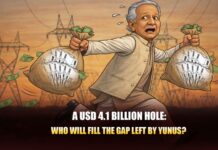America’s Strategic Mistake — Dr. Yunus Has Become a Burden
Once hailed as a “messenger of development” and lifted into Bangladesh’s political spotlight by powerful global actors—especially the United States—Dr. Muhammad Yunus is now proving to be the opposite: not a vessel of strategic interest, but a puppet of personal ambition.
If the United States seeks to safeguard its interests in South Asia through democracy, human rights, and resistance to extremism—then Dr. Yunus is its worst bet.
Blinded by Power, Opposed to the People, Off Course from America
Dr. Yunus now rules Bangladesh with overt support from the U.S. and Western diplomats. But his governance directly contradicts the values and policies the U.S. claims to stand for.
• He has stripped citizens of their right to vote.
• He has crushed judicial independence to consolidate power.
• His rule is built on political suppression, media crackdowns, and rampant human rights abuses.
• Worse still, he has empowered extremist factions that the U.S. identifies as global threats—by systematically destroying education, culture, and civil institutions.
Strategic Alignments Driven by Self-Interest
At a time when the U.S. is trying to maintain influence in South Asia, Yunus is moving dangerously close to America’s strategic rivals—China, Russia, and Iran—particularly on the issue of regional corridors and alignments. The question must be asked: Is Yunus serving U.S. interests, or misleading America to secure his own survival?
Public Rage, American Miscalculation
If the U.S. believes Yunus can deliver democracy, stability, and economic partnership in Bangladesh—they are gravely mistaken. The people have turned against him. His regime’s extremism, repression, and economic failures have made him an illegitimate, unpopular, and dangerous autocrat.
No long-term U.S. interests can be secured in South Asia under a regime so reviled by its own people. In fact, Yunus is fast becoming a symbol of anti-American sentiment in Bangladesh.
Dr. Yunus: America’s Burden, Bangladesh’s Crisis
To keep a nation as an ally, you need popular legitimacy, political stability, and moral leadership.
Yunus offers none. He is a self-serving, authoritarian opportunist, willing to sacrifice democracy, justice, and diplomacy to cling to power.
If the United States truly wishes to achieve strategic success in South Asia, it must abandon this failed gamble. Standing with the people of Bangladesh—not with Yunus—is the honorable and geopolitically sound path forward.





